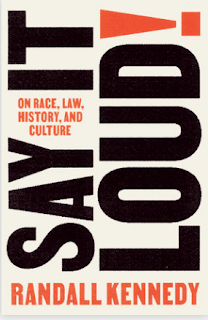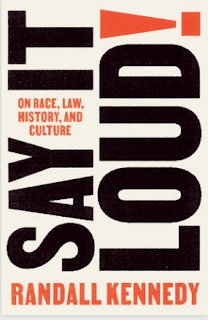Say it Loud Musings
I had the chance to meet and talk with Randall Kennedy one fall Saturday as we watched our sons play football at a small Northeastern liberal arts college. Of course, I was honored to meet a Harvard Law School professor and curious about his perspectives. It was the fall of 2016. Kennedy predicted a Trump win. I was shocked to hear that, but later, as we all know, Trump was proclaimed the winner of the election.
After that meeting, I took note of Kennedy's work when it appeared in the newspaper or via conversation with others. I saw one of his books on display at a Minneapolis art installation and used his personal story of success to inspire my young elementary school students.
Recently when Kennedy's book, Say it Loud, was published, I made a commitment to read it. The book sat on my bedstand for a few months, then I finally picked it up and started reading. While some of the book is difficult to grasp given the fact that I was not a law student, don't work in higher education and have only a cursory education when it comes to the history of African American life and advocacy, I am finding the book thought provoking, informative and transformational. This book will change me as it is introducing me to valuable concepts, worthy American leaders, multiple law/race/culture perspectives, and the world through Kennedy's experience and study.
So far, concepts that intrigue me are those related to the role of pessimism and optimism with regard to advocacy, the politics of respectability, and the role of pride/shame/kinship as well as solidarity in the lives we lead and work we do. As I read about the lives of many prominent African Americans in American society, I find myself thinking about what it means to do good work in life. Throughout the book, I find myself recognizing the worth of scholarship, open mindedness, a willingness to learn, ethics, the need at times to change your mind as you learn more, the virtues and deficiencies we all have, context, influences and engaging in advocacy for good reason even if you're unsure of whether that advocacy will result in change or not. I am also gaining language for describing social justice groups and efforts today. For example, Kennedy explains the need for and good work of the Black Lives Matter movement well when he writes, ". . .all people should insist that in light of evidence indicating a continuing devaluation of black lives, special efforts are warranted to underscore that black humanity is fully as precious as all other facets of humanity" and "They engaged in respectability politics even as they advanced a progressive racial agenda, adding a new chapter to an ongoing chronicle of admirable struggle for social justice."
As I continue reading the book, I'll continue to let Kennedy educate me. I also want to read reviews of the book by people who are more familiar with the information shared, and I've been talking about the book to friends who have added valuable commentary. For example, today when I discussed the politics of respectability and the Black Lives Matter movement with my sister, a lifelong educator, she mentioned that since the George Floyd protests, there are far more African Americans on television and in movies. She particularly referenced the Hallmark Channel whose representation of blacks and other races has changed dramatically. Further, together we wondered about why we weren't educated in the politics of respectability and how that would have helped us and other educators when it came to advocating for change. Together we agreed that advocacy should be taught to every teacher candidate so that they know how to create change effectively in schools from the grass roots level of teacher.
There's lots more to learn. Onward.



Comments
Post a Comment